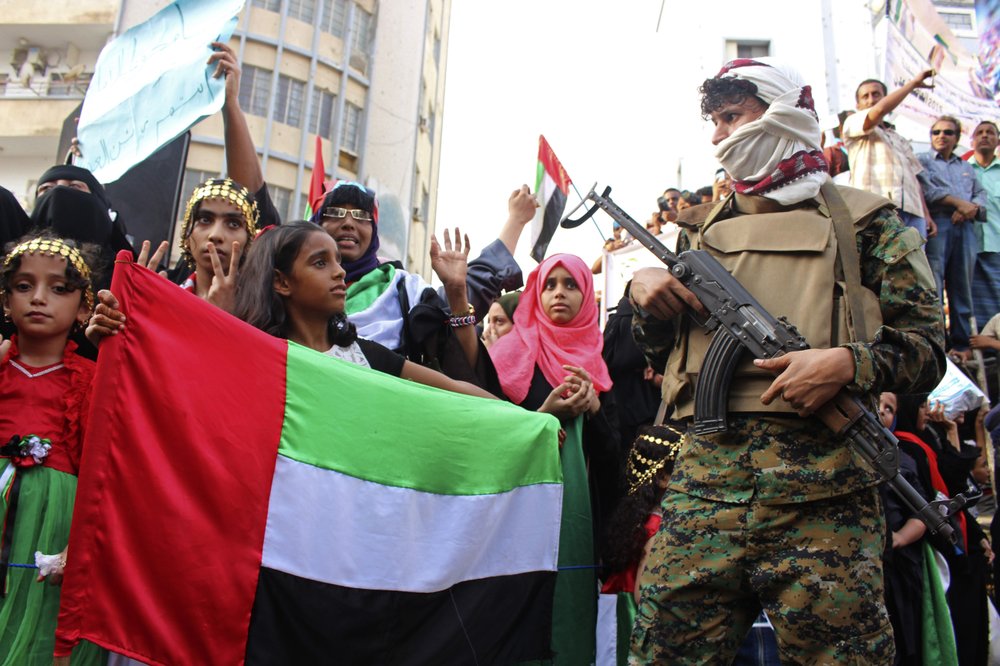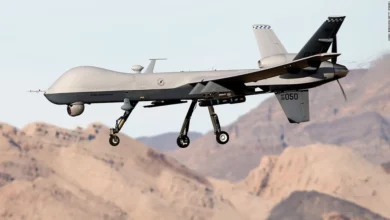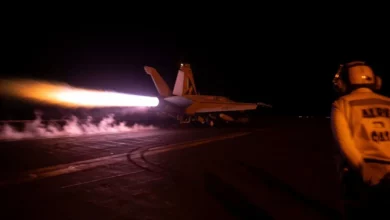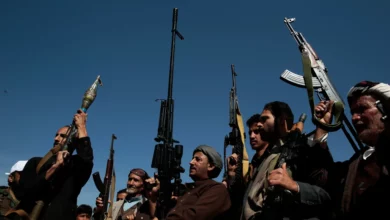Sanaa — Vast crowds of Yemenis took to the streets on Friday to demand the immediate departure of President Ali Abdullah Saleh, instead of the phased handover of power envisaged by a Gulf-mediated agreement.
Some 100,000 people flooded a five-km stretch of Sanaa's main Siteen Street to mark a "Friday of Loyalty to the Martyrs" — at least 142 protesters have been killed during three months of anti-Saleh unrest across Yemen.
"We will continue our revolution forcefully and we will not back down even if we have to offer a million martyrs," a cleric shouted to crowds, as they released balloons inscribed "Leave!."
Equally large pro-Saleh crowds also gathered in the capital to mark a "Friday of Constitutional Legitimacy." Waving flags, the demonstrators held pictures of the president and banners reading: "Be firm and don't back down, we are with you."
Saleh, facing the gravest challenge to his 32-year-old rule, addressed the rally himself. "These crowds of our people have said their word: yes, yes to the legitimacy of the constitution, no to coups, no to chaos," the 69-year-old leader said.
The United States and nearby top oil producer Saudi Arabia want the Yemen standoff resolved to avert chaos that could enable a Yemen-based wing of Al-Qaeda to operate more freely.
The fate of the deal to ease Saleh out of power could hang on how he handles the latest protests, with tension still high after the killing of 12 demonstrators in Sanaa on Wednesday.
Opponents of the agreement, due to be signed in Riyadh on Sunday, say the president cannot be trusted to honor it.
"We won't leave the square until victory when this regime leaves," the Muslim cleric at the Sanaa demonstration declared.
Even the opposition coalition that is party to the compromise warned Saleh on Thursday that any more violence against demonstrators could scupper the transition plan.
The bodies of the 12 protesters killed on Wednesday were to be buried after Friday prayers in Sanaa, rocked by three months of demonstrations seeking to match the success of popular revolts that toppled autocrats in Egypt and Tunisia.
"The people want the trial of the murderer," some anti-Saleh demonstrators shouted.
Tens of thousands of anti-Saleh protesters turned out in other cities, including Ibb, Baydah and Hudaida, where plainclothes gunmen wounded 10 demonstrators, activists said.
"Two of them were seriously injured, and they were abducted by what we think were plainclothes security men and put in a car. There was nothing we could do," said Abdulhafez al-Hatami, a political activist in the Red Sea port city.
NO "CARTE BLANCE" FOR VIOLENCE
Human Rights Watch said Saleh could not use the immunity from prosecution he has been promised under the transition deal as a carte blanche for attacks on peaceful protesters.
"President Saleh and those who implement his orders, take note: no immunity deal will absolve you of responsibility for widespread unlawful killings," said Joe Stork, the U.S.-based group's deputy Middle East director. "Yemeni courts and foreign governments will still be obligated to hold you to account."
The Interior Ministry said on Thursday that more than 21 policemen had also been killed and 1000 wounded since 3 February.
Saleh has accepted the deal in principle, but raised a snag on Thursday when he objected to Qatari officials attending the signing ceremony, saying
Doha was involved "in a conspiracy not just against Yemen but all Arab countries."
Saleh, who has in the past accused Qatar's Al Jazeera satellite channel of provoking the protests, also accused the tiny, gas-rich Gulf state of funding the opposition in Yemen.
His remarks provoked derision on the streets of Sanaa.
"The president is looking for ways to evade signing the Gulf initiative, so now he's using the excuse of Qatar. Next time he'll look for another excuse," said one woman, Aida Mohammed.
Marzouq Saleh, another passerby, was equally scathing. "All Arab presidents are angry with Qatar because of Al-Jazeera, including President Saleh. Oppressive regimes don't like coverage of the revolutions. But we, the people, are happy."
A government official has said Saleh will sign the agreement on Saturday in Sanaa, but send Abdel-Karim al-Iryani, vice president of his ruling party, to the official signing ceremony in Riyadh. The opposition coalition will also sign on Sunday.
The balance of power has tipped against Saleh, long seen in the West as a vital if inconstant ally against Al-Qaeda, after weeks of violence, military defections and political reversals.
Many youthful demonstrators have vowed to keep up protests until Saleh quits. They are skeptical of the main opposition parties, which have cooperated with the president in the past.
The deal mediated by the six-state Gulf Cooperation Council would give Saleh and his entourage, including relatives who run branches of the security forces, immunity from prosecution.
The president would have 30 days to resign. He would appoint a prime minister from the opposition to head a transitional government until a presidential election 60 days later.




